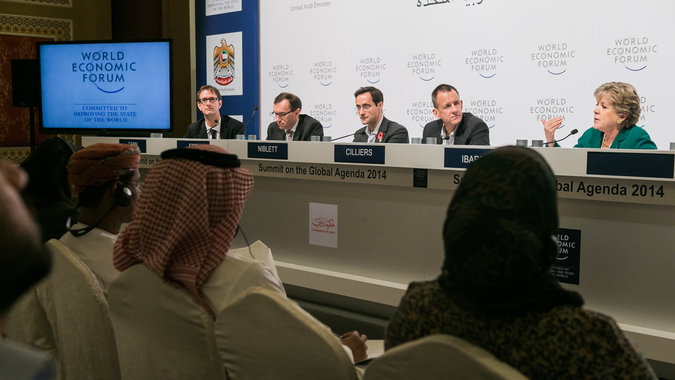News
The Executive Secretary of the Economic Commission for Latin America and the Caribbean (ECLAC), Alicia Bárcena, participated during the World Economic Forum (WEF), held from 9-11 November 2014 in Dubai, in the launch of the Global Think-Tank Community, which aims to generate analyses based on data and recommendations from a diverse array of geographic and substantive perspectives.
The initiative brings together 25 leading policy and research institutes and will advise WEF members and constituents on key issues facing the international community, with emphasis on the new challenges of the development agenda.
“The current lack of leadership and the loss of legitimacy of traditional leaders at a global, regional and national level has brought about the need for new voices from the South—not just from the North—as well as new actors such as think tanks and civil society, instead of just governments and enterprises. As we have been saying at ECLAC, it is about the vision that reformulates the State-market-society equation,” said Bárcena during a press conference.
Think tanks must be strengthened, promoting access to information and data as public assets and building confidence within and between societies, she added.
As Chair of the Global Agenda Council (GAC) on Latin America in the period 2014-2016, the United Nations senior official also discussed the report Outlook on the Global Agenda 2015, a compilation of ideas on the global agenda from the network of WEF councils, the main global community of think tank leaders.
The document, which publishes the results of a survey of council members, shows that corruption is currently the most significant problem for Latin America (77% of the respondents), indicating that strengthening institutions and the rule of law must remain a high priority on the governance agenda in the region.
“We need an enhanced balance between the State, the legislative and judicial branches, the civil society and private sector, which are instrumental for change,” stressed Alicia Bárcena.
The Global Agenda Council on Latin America, whose Vice President is Leonel Fernández, former President of the Dominican Republic, will work in the 2014-2016 period on documenting innovative approaches to achieve greater productivity and improve the region’s global insertion in a changing global context.



